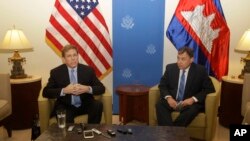The U.S. State Department's principal deputy assistant secretary for East Asian and Pacific Affairs, Patrick Murphy, on Friday called on the countries in the Indo-Pacific region to follow “free, open and rules-based” principles.
In a telephone press briefing to wrap up his trip to Thailand, Indonesia, and Hawaii last week, Murphy said democratic governance was a key discussion topic, particularly due to this past Sunday’s elections in Thailand, in addition to security and economic relations.
“This particular set of trips was a chance to address the importance of democratic governance as well, and a number of countries are going through, or preparing for, important national elections, including Thailand, Indonesia, the Philippines, which will have local elections, and even Australia anticipates elections later this year,” he said.
“I noted there are many visions within the region, and we welcome that, we embrace that, but we’re very encouraged to see such commonality among these visions in a free, open, and rules-based Indo-Pacific,” he said.
In Bangkok, Murphy met with Thai officials and others to discuss Thailand’s 2019 ASEAN Chairmanship and the U.S.-Thailand alliance.
“The U.S. is very pleased to see so many Thai people who have been quite hungry to exercise their rights and go to the voting places,” he said.
“We are very keen to see Thailand return to elected government. Democracy has served Thailand and the Thai people well in the past, and served the relationship and the region,” he said.
In August last year, President Donald Trump approved the nomination of Murphy as his pick to lead the U.S. mission in Cambodia amid soured U.S.-Cambodian relations over Phnom Penh’s handling of a general election in July 2018. He has yet to be confirmed.
“It’s a great honor for me personally to be nominated as an ambassador,” he told reporters.
“I was re-nominated in January and the process now resides with the U.S. Senate, and we look forward to their further consideration of that nomination as well as other nominations that are active for envoys to the region and positions in Washington,” he added.
Murphy’s appointment comes as relations between the two countries hit a low after Prime Minister Hun Sen, who has been in power for more than 30 years, accused Washington of sponsoring a plot to overthrow him by supporting the former opposition Cambodia National Rescue Party.
The CNRP was disbanded in November 2017 and its leader, Kem Sokha, arrested on treason charges, prompting criticism and limited sanctions on some officials.
Cambodia held a general election on July last year that saw Hun Sen’s ruling Cambodian People’s Party win every seat in parliament in the absence of the CNRP, which previously held a large minority.
Ou Virak, founding president of the Future Forum, a Cambodian think tank, told VOA Khmer that the decision to nominate Murphy may be a sign of the increasing importance Washington placed on Cambodia given its strengthening alliance with China.
“It’s a sign that the Trump Administration is considering Cambodia as a more important and strategic country as Patrick Murphy is senior and quite respected in Asia-Pacific diplomatic circles,” he said.
“It’s likely due to two reasons: the rise of China and its influence and the growing importance of Southeast Asia.”
Before being stationed at the State Department’s Asia division in 2016, Murphy was a diplomat in Thailand, serving as the deputy chief of mission, and a special envoy to Myanmar during the democratic transition before the 2014 election.
Over the past two years, Murphy has been a frequent visitor to Southeast Asia, including two visits to Cambodia in 2017.
The concept of the Indo-Pacific remains as a top priority for the U.S. government, according to Murphy.
“Among all of the global priorities, the Indo-Pacific is a top tier priority. We are continuing to work on garnering additional resources. Those resources have been identified in the most recent budget request, for example, for Indo-Pacific priorities,” he said.
“Our aspirations to see a region of sovereign, strong, prosperous countries,” he added.
Paul Chambers, a political analyst, and lecturer in Thailand's Naresuan University, said in an email: “The US stance in the Indo-Pacific stresses geo-politics over human rights though Washington emphasizes human rights in countries which, such as Cambodia, have seemed to side with China.”
He added that democracy promotion has been important in US foreign relations because such values reflect US political culture.
“Thus Washington has been an important plank of US relations with other countries,” he added.
Additional reporting by Aun Chhengpor.







